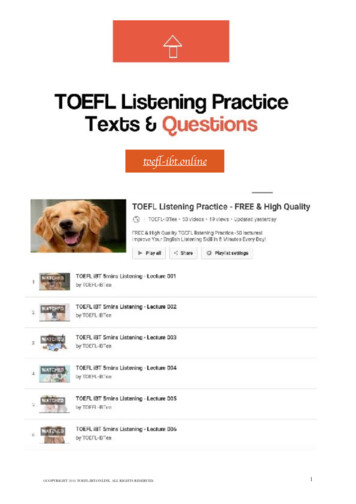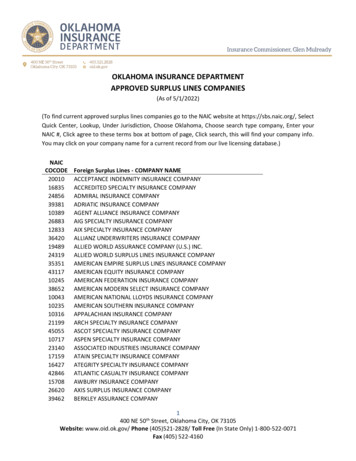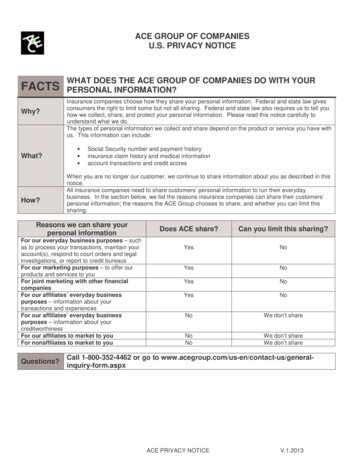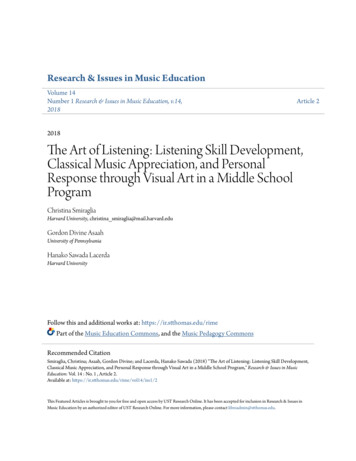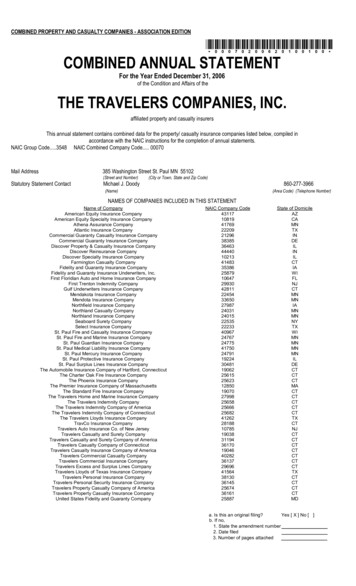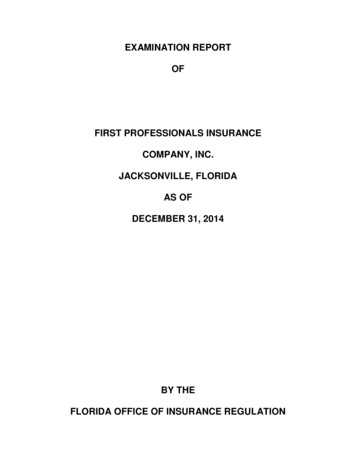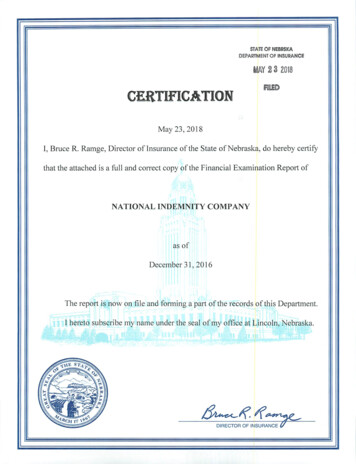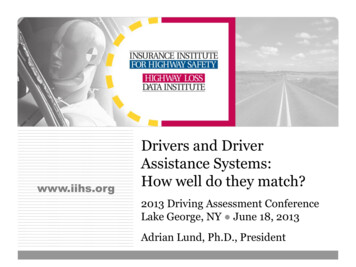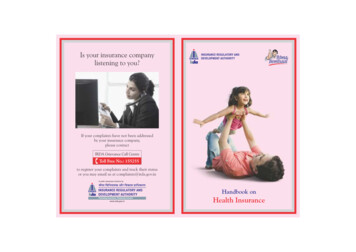
Transcription
Is your insurance companylistening to you?If your complaints have not been addressedby your insurance company,please contactto register your complaints and track their statusor you may email us at complaints@irda.gov.inHandbook onHealth Insurance
1. About this handbookContents:1. About this handbook12. Health Insurance23. Frequently asked questions64. Policyholder Servicing TATs145. If you have a grievance15This handbook is designed by the Insurance Regulatoryand Development Authority (IRDA) as a guide onHealth Insurance and gives general information only.No information given herein replaces or overrides theterms and conditions of an insurance policy.Please approach a duly licensed agent or a broker or aninsurance company registered with IRDA for specificinformation regarding a policy or for any otheradditional information.1
2. Health InsuranceThe term ‘Health Insurance’ relates to a type ofinsurance that essentially covers your medicalexpenses. A health insurance policy like other policies isa contract between an insurer and an individual / groupin which the insurer agrees to provide specified healthinsurance cover at a particular “premium” subject toterms and conditions specified in the policy. What a Health Insurance policy would normallycoverA Health Insurance Policy would normally coverexpenses reasonably and necessarily incurred underthe following heads in respect of each insured personsubject to overall ceiling of sum insured (for allclaims during one policy period).a) Room, Boarding expensesb) Nursing expensesc) Fees of surgeon, anesthetist, physician,consultants, specialistsd) Anesthesia, blood, oxygen, operation theatrecharges, surgical appliances, medicines, drugs,diagnostic materials, X-ray, Dialysis,chemotherapy, Radio therapy, cost of pacemaker, Artificial limbs, cost or organs andsimilar expenses. Sum InsuredThe Sum Insured offered may be on an individualbasis or on floater basis for the family as a whole. Cumulative Bonus ( CB)2 Health Insurance policies may offer CumulativeBonus wherein for every claim free year, the SumInsured is increased by a certain percentage at thetime of renewal subject to a maximum percentage(generally 50%). In case of a claim, CB will bereduced by 10% at the next renewal.Cost of Health Check-upHealth policies may also contain a provison forreimbursement of cost of health check up. Readyour policy carefully to understand what is allowed.Minimum period of stay in HospitalIn order to become eligible to make a claim underthe policy, minimum stay in the Hospital is necessaryfor a certain number of hours. Usually this is 24hours. This time limit may not apply for treatment ofaccidental injuries and for certain specifiedtreatments. Read the policy provision to understandthe details.Pre and post hospitalization expensesExpenses incurred during a certain number of daysprior to hospitalization and post hospitalizationexpenses for a specified period from the date ofdischarge may be considered as part of the claimprovided the expenses relate to the disease /sickness. Go through the specific provision in thisregard.Cashless FacilityInsurance companies have tie-up arrangementswith a network of hospitals in the country. If3
policyholder takes treatment in any of the net workhospitals, there is no need for the insured person topay hospital bills. The Insurance Company, throughits Third Party Administrator (TPA) will arrangedirect payment to the Hospital. Expenses beyondsub limits prescribed by the policy or items notcovered under the policy have to be settled by theinsured direct to the Hospital. The insured can taketreatment in a non-listed hospital in which case hehas to pay the bills first and then seekreimbursement from Insurance Co. There will be nocashless facility applicable here. Additional Benefits and other stand alone policiesInsurance companies offer various other benefits as“Add-ons” or riders. There are also stand alonepolicies that are designed to give benefits like“Hospital Cash”, “Critical Illness Benefits”,“Surgical Expense Benefits” etc. These policies caneither be taken separately or in addition to thehospitalization policy.A few companies have come out with products inthe nature of Top Up policies to meet the actualexpenses over and above the limit available in thebasic health policy. ExclusionsThe following are generally excluded under healthpolicies:a) All pre-existing diseases (the pre-existingdisease exclusion is uniformly defined by all nonlife and health insurance companies).4b) Under first year policy, any claim during the first30 days from date of cover, for sickness / disease.This is not applicable for accidental injuryclaims.c) During first year of cover – cataract, Benignprostatic hypertrophy, Hysterectomy forMenorrhagia or Fibromyoma, Hernia,Hydrocele, Congenital Internal diseases, Fistulain anus, piles, sinusitis and related disorders.d) Circumcision unless for treatment of a diseasee) Cost of specs, contact lenses, hearing aidsf) Dental treatment / surgery unless requiringhospitalizationg) Convalescence, general debility, congenitalexternal defects, V.D., intentional self-injury,use of intoxicating drugs / alcohol, AIDS,Expenses for Diagnosis, X-ray or lab tests notconsistent with the disease requiringhospitalization.h) Treatment relating to pregnancy or child birthincluding cesarean sectioni) Naturopathy treatment.The actual exclusions may vary from product toproduct and company to company. In group policies,it may possible to waive / delete the exclusions onpayment of extra premium. No short period policiesHealth insurance policies are not issued for less thanone year period.5
3.FAQs on Health InsuranceQ. What is Health Insurance?Ans. The term health insurance is a type ofinsurance that covers your medical expenses.A health insurance policy is a contract betweenan insurer and an individual /group in which theinsurer agrees to provide specified healthinsurance cover at a particular “premium”.Q. What are the forms of Health Insuranceavailable?Ans. The commonest form of health insurance policiesin India cover the expenses incurred onHospitalization, though a variety of products arenow available which offer a range of healthcovers, depending on the need and choice of theinsured. The health insurer usually provideseither direct payment to hospital (cashlessfacility) or reimburses the expenses associatedwith illnesses and injuries or disburses a fixedbenefit on occurrence of an illness. The type andamount of health care costs that will be coveredby the health plan are specified in advance.Q. Why is Health Insurance important?Ans. All of us should buy health insurance and forall members of our family, according to ourneeds. Buying health insurance protects us fromthe sudden, unexpected costs of hospitalization(or other covered health events, like criticalillnesses) which would otherwise make a majordent into household savings or even lead toindebtedness.6Each of us is exposed to various health hazardsand a medical emergency can strike anyone of uswithout any prior warning. Healthcare isincreasingly expensive, with technologicaladvances, new procedures and more effectivemedicines that have also driven up the costs ofhealthcare. While these high treatment expensesmay be beyond the reach of many, taking thesecurity of health insurance is much moreaffordable.Q. What kinds of Health Insurance plans areavailable?Ans. Health insurance policies are available from asum insured of Rs 5000 in micro-insurancepolicies to even a sum insured of Rs 50 lakhs ormore in certain critical illness plans. Mostinsurers offer policies between 1 lakh to 5 lakhsum insured. As the room rents and otherexpenses payable by insurers are increasinglybeing linked to the sum insured opted for, it isadvisable to take adequate cover from an earlyage, particularly because it may not be easy toincrease the sum insured after a claim occurs.Also, while most non-life insurance companiesoffer health insurance policies for a duration ofone year, there are policies that are issued fortwo, three, four and five years duration also. Lifeinsurance companies have plans which couldextend even longer in the duration.A Hospitalization policy covers, fully or partly,the actual cost of the treatment for hospitaladmissions during the policy period. This is a7
wider form of coverage applicable for varioushospitalization expenses, including expensesbefore and after hospitalization for some specifiedperiod. Such policies may be available onindividual sum insured basis, or on a family floaterbasis where the sum insured is shared across thefamily members.Another type of product, the Hospital DailyCash Benefit policy, provides a fixed daily suminsured for each day of hospitalization. There mayalso be coverage for a higher daily benefit in caseof ICU admissions or for specified illnesses orinjuries.A Critical Illness benefit policy provides a fixedlumpsum amount to the insured in case ofdiagnosis of a specified illness or on undergoing aspecified procedure. This amount is helpful inmitigating various direct and indirect financialconsequences of a critical illness. Usually, oncethis lump sum is paid, the plan ceases to remain inforce.There are also other types of products, which offerlumpsum payment on undergoing a specifiedsurgery (Surgical Cash Benefit), and otherscatering to the needs of specified target audiencelike senior citizens.Q. What is cashless facility?Ans. Insurance companies have tie-up arrangementswith several hospitals all over the country as partof their network. Under a health insurancepolicy offering cashless facility, a policyholder can8take treatment in any of the network hospitalswithout having to pay the hospital bills as thepayment is made to the hospital directly by theThird Party Administrator, on behalf of theinsurance company. However, expenses beyondthe limits or sub-limits allowed by the insurancepolicy or expenses not covered under the policyhave to be settled by you directly with thehospital.Cashless facility, however, is not available if youtake treatment in a hospital that is not in thenetwork.Q. What are the tax benefits I get if I opt for HealthInsurance?Ans. Health insurance comes with attractive taxbenefits as an added incentive. There is anexclusive section of the Income Tax Act whichprovides tax benefits for health insurance, whichis Section 80D, and which is unlike the section80C applicable to Life Insurance wherein otherform of investments/ expenditure also qualify forthe deduction.Currently, purchasers of health insurance whohave purchased the policy by any payment modeother than cash can avail of an annual deductionof Rs. 15,000 from their taxable income forpayment of Health Insurance premium for self,spouse and dependent children. For seniorcitizens, this deduction is higher, and is Rs.20,000.Further, since the financial year 2008-09, an9
additional Rs 15,000 is available as deduction forhealth insurance premium paid on behalf ofparents, which again is Rs 20,000 if the parentsare senior citizens.Q. What are the factors that affect HealthInsurance premium?Ans. Age is a major factor that determines thepremium, the older you are the premium cost willbe higher because you are more prone to illnesses.Previous medical history is another major factorthat determines the premium. If no prior medicalhistory exists, premium will automatically belower. Claim free years can also be a factor indetermining the cost of the premium as it mightbenefit you with certain percentage of discount.This will automatically help you reduce yourpremium.Q. What does a Health Insurance policy notcover?Ans. You must read the prospectus/ policy andunderstand what is not covered under it.Generally, pre-existing diseases (read the policyto understand what a pre-existing disease isdefined as) are excluded under a HealthInsurance policy. Further, the policy wouldgenerally exclude certain diseases from the firstyear of coverage and also impose a waiting period.There would also be certain standard exclusionssuch as cost of spectacles, contact lenses andhearing aids not being covered, dentaltreatment/surgery (unless requiring10hospitalization) not being covered,convalescence, general debility, congenitalexternal defects, venereal disease, intentionalself-injury, use of intoxicating drugs/alcohol,AIDS, expenses for diagnosis, x-ray or laboratorytests not consistent with the disease requiringhospitalization, treatment relating to pregnancyor child birth including cesarean section,Naturopathy treatment.Q. Is there any Waiting Period for claims under apolicy?Ans. Yes. When you get a new policy, generally, therewill be a 30 days waiting period starting from thepolicy inception date, during which period anyhospitalization charges will not be payable by theinsurance companies. However, this is notapplicable to any emergency hospitalizationoccurring due to an accident. This waiting periodwill not be applicable for subsequent policiesunder renewal.Q. What is pre-existing condition in healthinsurance policy?Ans. It is a medical condition/disease that existedbefore you obtained health insurance policy, andit is significant, because the insurance companiesdo not cover such pre-existing conditions, within48 months of prior to the 1st policy. It means,pre-existing conditions can be considered forpayment after completion of 48 months ofcontinuous insurance cover.11
Q.If my policy is not renewed in time beforeexpiry date, will I be denied for renewal?Ans. The policy will be renewable provided you pay thepremium within 15 days (called as Grace Period)of expiry date. However, coverage would not beavailable for the period for which no premium isreceived by the insurance company. The policywill lapse if the premium is not paid within thegrace period.Q. Can I transfer my policy from one insurancecompany to another without losing the renewalbenefits?Ans. Yes. The Insurance Regulatory and DevelopmentAuthority ( IRDA ) has issued a circular making iteffective from 1st July,2011, which directs theinsurance companies to allow portability fromone insurance company to another and from oneplan to another, without making the insured tolose the renewal credits for pre-existingconditions, enjoyed in the previous policy.However, this credit will be limited to the SumInsured (including Bonus) under previous policy.For details, you may check with the insurancecompany.Q. What happens to the policy coverage after aclaim is filed?Ans. After a claim is filed and settled, the policycoverage is reduced by the amount that has beenpaid out on settlement. For Example: In Januaryyou start a policy with a coverage of Rs 5 Lakh forthe year. In April, you make a claim of Rs 2 lakh.12The coverage available to you for the May toDecember will be the balance of Rs.3 lakh.Q. What is 'Any one illness' ?Ans. 'Any one illness' would mean the continuousperiod of illness, including relapse within acertain number of days as specified in the policy.Usually this is 45 daysQ: What is the maximum number of claimsallowed over a year?Any number of claims is allowed during the policyperiod unless there is a specific cap prescribed inany policy. However the sum insured is themaximum limit under the policy.Q. What is “health check” facility?Some health insurance policies pay for specifiedexpenses towards general health check up oncein a few years. Normally this is available once infour years.Q: What do you mean by Family Floater Policy?Family Floater is one single policy that takes careof the hospitalization expenses of your entirefamily. The policy has one single sum insured,which can be utilised by any/all insured persons inany proportion or amount subject to maximum ofoverall limit of the policy sum insured. Quiteoften Family floater plans are better than buyingseparate individual policies. Family Floater planstakes care of all the medical expenses duringsudden illness, surgeries and accidents.13
Policyholder Servicing Turnaround Timesas prescribed by IRDAServiceMaximumTurn Around TimeGeneralProcessing of Proposal and Communicationof decisions including requirements/issueof Policy /CancellationsObtaining copy of the proposalPost Policy issue service requests concerningmistakes/refund of proposal deposit and alsoNon-Claim related service requests15 days30 days10 daysLife InsuranceSurrender value/annuity/pension processingMaturity claim/Survival benefit/penal interestnot paidRaising claim requirements after lodgingthe ClaimDeath claim settlement withoutInvestigation requirementDeath claim settlement/repudiation withInvestigation requirement10 days15 days15 days30 days6 monthsGeneral InsuranceSurvey report submissionInsurer seeking addendum reportSettlement/rejection of Claim after receivingfirst/addendum survey report30 days15 days30 daysGrievancesAcknowledge a grievanceResolve a grievance143 days15 days5. If you have a grievance:The Consumer Affairs Department of the InsuranceRegulatory and Development Authority (IRDA) hasintroduced the Integrated Grievance ManagementSystem (IGMS) which is an online system forregistration and tracking of grievances. You mustregister your grievance first with the insurancecompany and in case you are not satisfied with itsdisposal by the company, you may escalate it to IRDAthrough IGMS by accessing www.igms.irda.gov.in. Incase you are not able to access the insurer’s grievancesystem directly, IGMS also provides you a gateway toregister your grievance with the insurer.Apart from registering your grievance through IGMS(i.e., web), you have several channels for grievanceregistration-through e-mail (complaints@irda.gov.in),through letter (address your letter to Consumer AffairsDepartment, Insurance Regulatory and DevelopmentAuthority, 3rd Floor, Parishram Bhavan, Basheerbagh,Hyderabad:4) or simply call IRDA Call Centre atToll Free 155255 through which IRDA shall, free ofcost, register you complaints against insurancecompanies as well as help track its status. The CallCentre assists by filling up the complaints form on thebasis of the call. Wherever required, it will facilitate infiling of complaints directly with the insurancecompanies as the first port of call by giving information15
relating to the address, telephone number, websitedetails, contact number, e-mail id etc of the insurancecompany. IRDA Call Centre offers a true alternativechannel for prospects and policyholders, withcomprehensive tele-functionalities, serving as a12 hours x 6 days service platform from 8 AM to 8 PM,Monday to Saturday in Hindi, English and variousIndian languages.When a complaint is registered with IRDA, it facilitatesresolution by taking it up with the insurance company.The company is given 15 days time to resolve thecomplaint. If required, IRDA carries out investigationsand enquiries. Further, wherever applicable, IRDAadvises the complainant to approach the InsuranceOmbudsman in terms of the Redressal of PublicGrievances Rules, 1998.16Disclaimer:This handbook is intended to provide you general information onlyand is not exhaustive. It is an education initiative and does not seek togive you any legal advice.
3. FAQs on Health Insurance Q. What is Health Insurance? Ans. The term health insurance is a type of insurance that covers your medical expenses. A health insurance policy is a contract between an insurer and an individual /group in which the insurer agrees to provide specified health insurance cover at a particular "premium". Q.
